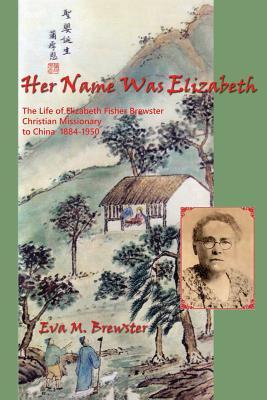Part biography/spiritual memoir, part adventure tale, Her Name Was Elizabeth, by Eva M. Brewster is the inspiring story of Elizabeth Fisher Brewster, Christian missionary to China for 67 years. Elizabeth Brewster was one of the many single women missionaries in the late 19th and early 20th centuries who left their homes and sailed to far-off exotic places, dedicating themselves to lives of Christian service. In a time when women's roles were largely circumscribed by home and family, single women missionaries with few professional credentials and no special status thrust themselves into adventurous and sometimes heart-breaking lives of great toil and achievement.
Elizabeth was just 22 years-old when she arrived in a China still ruled by the dying Manchu Dynasty. The Chinese masses lived lives of crushing toil in rural poverty with little hope of a better life. Among her many duties, it was the downtrodden women, who were considered unworthy of being educated, that were Elizabeth's strong concern. Travelling to country villages, she was paraded before the populace, who wished to see the "big heavenly feet" of the foreign lady missionary. Elizabeth labored mightily to change the cruel practice of foot-binding and the attitudes and customs that literally hobbled women, seeking to instill an ideal of education as the way forward for women.
In 1890 Elizabeth married fellow Methodist missionary and minister, William Nesbitt Brewster. They settled in Hinghwa on the Min River near the coastal city of Fuzhou in the south of China, raising a family of six children and carrying on the work of the mission. The essence of their mission was "Christ made visible through deeds." Material things are holy, too, they believed, and they made every effort to improve the lot of their adopted countrymen. They persisted in the face of criticism from the mission board, some of whom felt that missionaries should limit their efforts to evangelism.
When William died in 1916, Elizabeth stayed on another 34 years, leaving only when all foreigners were ousted in 1950 by the Communist regime. Entrusting her life and work into God's hands, like the story of Ruth in the Bible, she had made the Chinese people her own people. When China was plunged into civil war, Elizabeth strove to keep the mission's schools, hospitals and churches oases of neutrality. Under bombardment and imminent danger of total destruction, she kept her equilibrium, saying, "It is often necessary to go quietly on with work in hand, knowing the spirit will speak when it is necessary."Her "outsider" status as a missionary and her spirit-led decisions were, on several occasions, crucial in saving lives and averting catastrophes.
The local Chinese people found much to admire in this woman of enduring selfless service. They called her "Miss Star" when she was a young, spirited woman freshly arrived in their country. Later they called her "Mother Shepherdess"and even "Friend of the Bandits." Elizabeth traveled safely in rural areas between feuding factions, displaying a white flag. All of the involved parties knew her as the kindly foreign missionary woman who had taught their countrymen and cared for them when they were children.
Daughter-in-law Eva tells an engaging story of daily life; hearts touching hearts in a foriegn land. The narrative unfolds in the context of conversations between the two women - one an artist by temperament, the other a seasoned missionary and revered family elder. The tenderness of their relationship gives this book, written almost 70 years ago, a freshness and warmth which shines through and imparts timeless lessons of faith and hope to today's reader.
